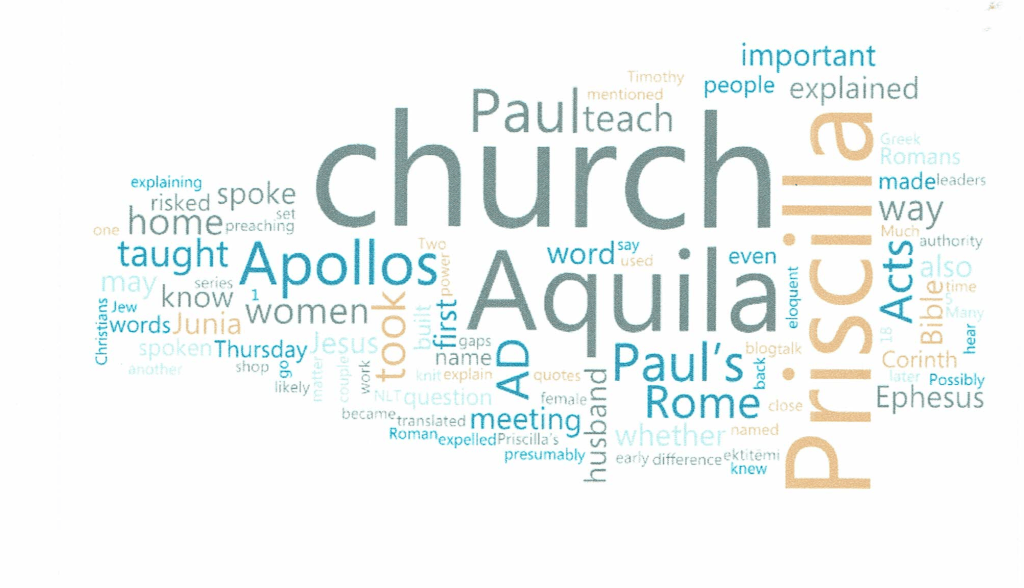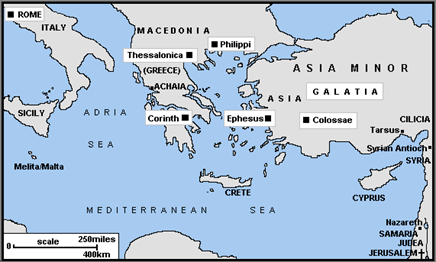Welcome to the third of my blogs in the series on how Women (also) Built The Church. So far we have looked at Junia and Andronicus, this time, its the turn of another power couple mentioned in the New Testament, Priscilla and Aquila.
I recently spoke at a church meeting on a Thursday afternoon about my novels, Leaving Bethany and Return to Caesarea and my character, Martha’s experience of the cross and resurrection. Initially, I asked to speak either on a Sunday morning or at a midweek meeting and the pastor suggested a midweek would be best. The pastor was very encouraging and thanked me warmly afterwards. A few weeks later, I spoke to a member of the church who told me I could not have spoken on a Sunday as women are not allowed to preach or teach in church on a Sunday or in home groups.
When I asked whether I taught at the meeting, they told me I simply talked about my books. I had spoken about Lent, how Jesus had female disciples and how he interacted with them. To me, this was teaching about the Bible and, dare I say, theology, regardless of it being a Thursday afternoon rather than church on a Sunday. What is the difference? This question is important when we think about Priscilla and her husband, Aquila. More on this later.
Who were Priscilla and Aquila?
Prisca is sometimes referred to by her pet name Priscilla and, along with her husband Aquila, is mentioned six times in the New Testament. (Acts 18:1-3, 18-19, Romans 16: 3-5, 1 Corinthians 16:19, 2 Timothy 4:19). They are always spoken of together, showing how close they were and how both were Paul’s co-workers.
It was usual in Roman society to name the husband first, but Priscilla is named before Aquila four times. It may be that she was of higher social standing, or she was more prominent in the church than Aquila was.
Why were they important to Paul?
Paul gives us a tantalising insight into their lives, calling them his co-workers. I would love to know the circumstances of how they risked their lives for him, but they were undoubtedly a brave couple who risked everything for the gospel.
They were Greek-speaking Jews, and we know Aquila was from Pontus, nowadays in northern Turkey, and it is likely Priscilla was from there too. When we first hear about them, they had been expelled from Rome under Emperor Claudius in the AD 40s and made their way to Corinth. Many leaders of the church were expelled, and, likely, they were already in church leadership then. Where they became Christians, we do not know, but people from Pontus were present at Pentecost. (Acts 2:9) They may have been very early believers, and one of the first to take the message to Rome.
Settling in the cosmopolitan city of Corinth, they set themselves up as tent makers, presumably a skill they took with them from Rome. Possibly having a small shop with a work room and living quarters at the back, which became the focus of a church meeting. It was here in the spring of 50 AD they met Paul who stayed and worked with them in their business.
Autumn of AD 52, they sailed to Ephesus alongside Paul, who soon left them for Jerusalem. Presumably, Priscilla and Aquila set up shop as before and began to share the good news of Jesus as they had in Corinth. Paul wrote his letter to the Romans in the mid to late AD 50s and, with Claudius’s death in AD 54, they would have felt safe to return to Rome. Paul’s prayer was for him to go to Rome, and considering their close working relationship, they may have gone on ahead to prepare the church for his coming.
Teaching Apollos
It was in Ephesus that they encountered Apollos. People from Pontus were regarded in the Roman empire as ignorant and stupid, and Apollos was a learned and eloquent Jew from Alexandria, the seat of learning. What happened when they met?
Apollos turned up in Ephesus with gaps in his knowledge and understanding of his Christian faith. Whatever these gaps were, both Priscilla and Aquila took him aside and explained the way more accurately. With Priscilla’s name first in this context, maybe she took the lead. Apollos shows his true character and receives the instruction, even from a woman, and later goes on to work closely with Paul.
Much is made of the words they took him aside and explained concerning Priscilla’s teaching. Especially in the light of Paul’s words in 1 Timothy 2:12, that women should not teach or have authority over a man.
They took him aside. Where? Probably not the synagogue or in the street, but somewhere private like their own home, where the church met. Some people point out that this was an informal setting and therefore Paul’s prohibition for women to teach was not relevant here. But their home was where the church met. The authority of Paul’s teaching did not change whether he spoke to crowds in the marketplace, in prison, lecture hall, or house church. It also did not change if it was the Sabbath or not. The validity of Paul’s teaching is not called into question, no matter the venue or day of the week.
Several verbs are used in the New Testament to communicate the Christian faith. In Acts 18:26, the Greek word, ektitēmi, is translated into English as explain. Another word often used is didaskō, usually translated as teach. Is Priscilla explaining the gospel to Apollos lesser than teaching it?
Luke is the only author to use ektitēmi, and he uses it four times in Acts. Two of which are to describe how Peter and Paul spoke to a group. (See Acts 11:4 and 28:23) Are these occasions less important because of the word explain rather than teach?
As with my July 2023 blog on Junia, we need to hear the voice of the church leaders and teachers nearer to the time of the early church. The fourth-century theologian John Chrysostom highlights Priscilla as the one who taught Apollos the way of the Lord, and how she, more than Aquila, made their home a church.
Conclusion
Let’s go back to the beginning and the question of whether my Thursday talk was teaching or not. I did a similar talk on a Sunday morning in a church during the sermon slot. Should we class this as preaching, teaching or explaining, and does it matter? If I show you how to knit, it makes no difference whether you say I explained or taught you. If you could not knit before and you can now, the result is the same. And is the day of the week you learn important?
We do not know what happened to Aquila and Priscilla, but if they were still in Rome, they may have been caught up in Nero’s persecution in AD 64. Possibly even dying as martyrs as so many unnamed Christians did.
As a church, we owe so much to these two power couples, Priscilla and Aquila, and Junia and Andronicus. They, and their fellow brothers and sisters, laid the firm foundation upon which the church is built.
Next month, Priscilla tells Aemilia Metella her story, and how she and her husband risked their lives for Paul and saved him from a dangerous situation.
Previous blogs in the How Women (Also) Built The Church series

“Give my greetings to Priscilla and Aquila, my co-workers in the ministry of Christ Jesus. In fact, they once risked their lives for me. I am thankful to them, and so are all the Gentile churches. Also give my greetings to the church that meets in their home.” Romans 16:3-5 NLT


From https://www.ccel.org/bible/phillips/CN092MAPS1.htm
“Meanwhile, a Jew named Apollos, an eloquent speaker who knew the Scriptures well, had arrived in Ephesus from Alexandria in Egypt. He had been taught the way of the Lord, and he taught others about Jesus with an enthusiastic spirit and with accuracy. However, he knew only about John’s baptism. When Priscilla and Aquila heard him preaching boldly in the synagogue, they took him aside and explained the way of God even more accurately.” Acts 18: 24-26 NLT

Susan Sutherland is the author of three books. To buy Leaving Bethany and the sequel Return to Caesarea please go to the buy page.
If you like Susan’s blogs sign up for the mailing list and receive a free copy of The Aemilia Metella Interviews.
